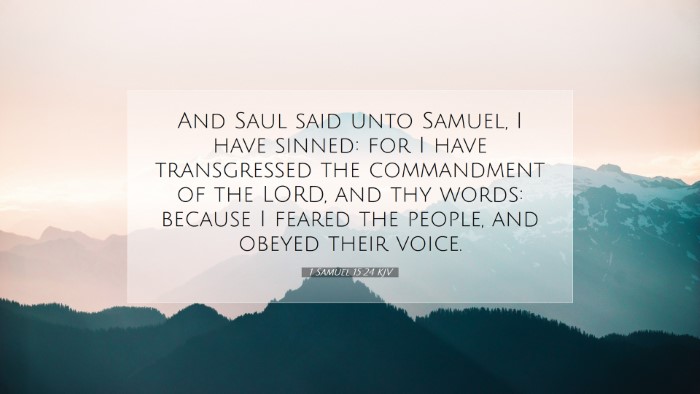Commentary on 1 Samuel 15:24
Verse: 1 Samuel 15:24 - "And Saul said unto Samuel, I have sinned: for I have transgressed the commandment of the Lord, and thy words: because I feared the people, and obeyed their voice."
This verse encapsulates a critical moment in the narrative of Saul's reign as the first king of Israel. It serves as a poignant reflection on obedience, authority, and the consequences of sin within Israel's early leadership.
Contextual Analysis
At this juncture, God had commanded Saul through the prophet Samuel to destroy the Amalekites completely. Saul's failure to adhere strictly to this command by sparing King Agag and keeping the best of the livestock stands as a stark reminder of the importance of complete obedience to divine instruction.
The tension between divine command and human inclination is evident as Saul confesses his sin while simultaneously revealing his reluctance to confront the disobedience directly.
Theological Insights
- Saul's Admission of Sin: Saul's acknowledgment of his transgression is significant. It opens a discussion about the nature of repentance and the condition of one's heart when admitting wrongdoing.
- Fear of Man: The phrase “because I feared the people” illustrates the pervasive issue of peer pressure and the fear of public opinion, which can lead leaders astray from divine mandates.
- Obedience vs. Sacrifice: The broader theological implication of this passage often circles back to the idea that God prioritizes obedience over ritual sacrifice, emphasizing that following His commands is paramount.
Commentary from Matthew Henry
Matthew Henry expresses that Saul's admission is one of the more painful forms of acknowledgment as it reveals a heart that was not wholly devoted to God. He notes that Saul’s sin stemmed from a desire to appease the people rather than to please God. Henry emphasizes that obedience to God’s command should take precedence over human approval.
- Human Approval vs. Divine Command: Henry highlights how Saul allowed the fear of man to dictate his actions, which ultimately led to his downfall. This opens a discourse on leaders prioritizing God’s will above societal pressures.
- Saul’s Broken Leadership: The commentary also notes that Saul’s confession came too late, pointing to an unrepentant leader's eventual ruin.
Commentary from Albert Barnes
Albert Barnes examines the idea of Saul attempting to project a sense of integrity in his admission of sin. Barnes indicates that such confessing is often insufficient if it does not stem from a heart of genuine repentance.
- The Nature of Sin: Barnes draws attention to the nature of sin — that it often comes from a place of fear and weakness when one chooses to align with others over adhering to God’s directives.
- The Role of Authority: Barnes emphasizes that God's authority is paramount, and Saul’s concession to human influence effectively undermines this authority.
Commentary from Adam Clarke
Adam Clarke provides a nuanced interpretation by highlighting the tragic irony of Saul’s plight. He recognizes that, while Saul confesses his sin, the admission is often more about the fear of consequences than a contrite heart.
- Repentance and Regret: Clarke posits that an effective repentance not only acknowledges sin but also leads to a transformative change. Saul's admission lacked the depth necessary for true restoration.
- The Consequences of Disobedience: Clarke notes that Saul’s failure to fully obey results in God's rejection of him as king, which carries profound implications for his leadership and future.
Application for Modern Context
The lessons drawn from this scripture resonate deeply with contemporary leaders in various spheres—including the church. Saul's predicament serves as a cautionary tale about the perils of yielding to worldly pressures over divine command.
- Leadership Integrity: Leaders are called to maintain integrity and make choices based on God’s truth rather than succumbing to popular opinion.
- The Cost of Disobedience: The consequences of ignoring divine commandments can be dire; thus, this passage serves as a reminder to hold fast to God’s instruction.
- The Importance of True Repentance: Genuine repentance seeks not only to confess but also to turn away from sinful behaviors, fostering a relationship built on trust and obedience towards God.
Conclusion
In 1 Samuel 15:24, we witness the gravity of sin, through Saul's acknowledgment of his actions. The convergence of divine authority with human frailty illustrates the challenges faced by leaders who must balance their roles while adhering to God’s commands. The commentaries by Matthew Henry, Albert Barnes, and Adam Clarke shed light on the complexities of obedience, the struggle against peer influence, and the essential nature of genuine repentance. For pastors, students, theologians, and scholars alike, this passage challenges us to examine our own hearts and align our actions with the call of God, prioritizing His will above all else.


